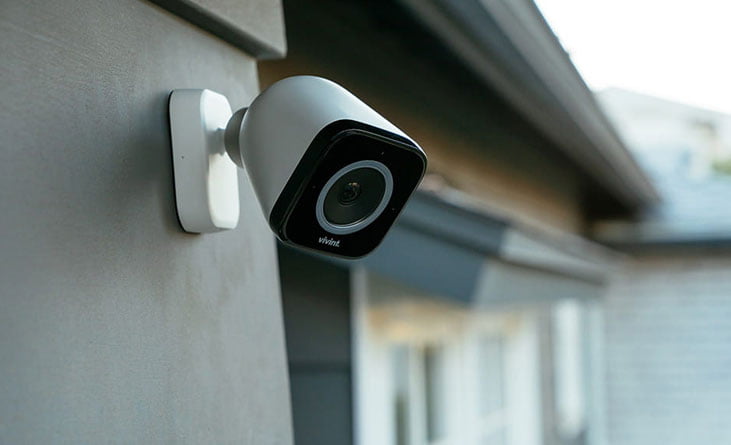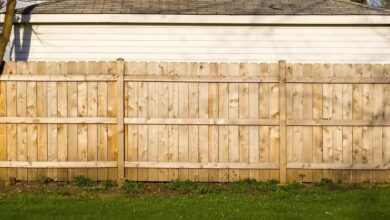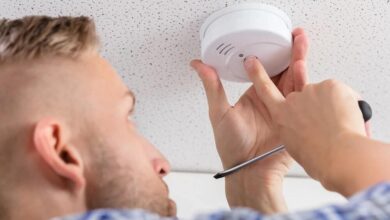Are Home Security Systems Worth the Cost? Everything You Need to Know

Installing a home security system is one of the best ways to deter burglars and protect your home. But are expensive alarm systems really worth the investment?
In this comprehensive guide, we’ll explore the costs, benefits, and key factors to consider when deciding whether a home security system is worth it for you. Read on to learn why modern home security can provide peace of mind and make your home safer.
What Does a Home Security System Include?
A home security system refers to a combination of devices that work together to monitor and protect your home. At the basic level, this includes:
- Control panel – The brains of the system that communicates with sensors and runs the system. Can be accessed via a wall-mounted panel, wireless keypads, or an app.
- Sensors – Detect intrusions, smoke, fire, water leaks, temperature changes, and more. Sensors protect windows, doors, and other entry points.
- Alarm or siren – Loud noise that scares away burglars and alerts neighbors of a break-in.
- Security cameras – Capture video footage of activity to verify alarms and see what’s happening in/around your home.
- Monitoring service – Optional service where alarm events are sent to a monitoring center who can dispatch help if needed.
Other features like home automation, smart locks, video doorbells, and more may also be included with or added onto your system.
How Much Does a Home Security System Cost?
System costs vary significantly based on the provider, equipment, and features you choose. On average, most homeowners spend $200-$500 on equipment/installation and $15-$60 per month for professional monitoring.
Equipment costs – Purchasing a system upfront ranges from $99 for basic DIY systems to $1,500+ for high-end systems installed by a security company. Equipment costs depend on things like:
- Number and types of sensors/cameras needed to cover your home
- Whether you choose wireless or wired security
- Smart home capabilities
- Signage and yard signs
Installation – Expect to pay $99-$250 for self-installation of a DIY system. Professionally installed systems often provide free installation when you sign a monitoring contract.
Professional monitoring – Optional service ranges from $10-$60 per month. Monitoring plans offer different features like push notifications, automation triggers, and 24/7 live agents.
Other costs – Remember to budget for any permit fees or monthly utility costs to power your system. Ongoing maintenance and tech support may also have fees.
What Are the Benefits of a Home Security System?
Investing in home security provides important advantages that make your home safer and your family more secure. Benefits include:
Deterring burglars – Burglars actively avoid homes with security systems. Sirens, cameras, and visible security signage signal that your home will be more difficult to break into and not worth the risk.
Quick police response – Security systems receive priority police response since potential crime is in progress when alarms go off. Systems with monitoring have the quickest response times.
Peace of mind – Security systems provide 24/7 protection whether you’re home or away. Alarm notifications let you actively monitor your home.
Insurance discounts – Many insurance companies offer up to 20% discounts for professionally monitored security systems.
Protects your family – Smart home features like smoke and carbon monoxide detection, temperature control, and water leak monitoring provide around-the-clock safety for your family.
Convenience – Features like smart locks make accessing your home more convenient. Viewing cameras and controlling your system remotely keeps you connected from anywhere.
Key Questions to Consider When Choosing a System
The right home security system for you depends on several factors specific to your home and family. Keep these important considerations in mind:
How much square footage do you need to cover?
Bigger homes require more equipment to monitor all access points. Make a list of all windows, doors, and other areas that need protecting to determine how many security sensors and cameras you need.
What level of monitoring do you want?
Options range from self-monitoring apps to live agent support. Evaluate your comfort level and convenience preferences.
What’s your budget for equipment, installation, and monthly fees?
Upfront and ongoing costs vary widely for security systems. Make sure you can fit the system into your monthly household budget long-term.
Do you want smart home capabilities?
Many systems offer home automation features like smart lights, thermostats, locks, and more. This provides added security, safety, and convenience.
Are you comfortable installing a DIY system?
DIY systems cost less but require you to install them yourself. Make sure you have the time and technical ability to properly set up and maintain the system.
Do you need systems that work without landlines?
Some providers require phone landlines to connect systems. Cellular and wireless systems are better options for many modern homes and apartments without landlines.
8 Pros of Getting a Security System Installed
Wondering if the investment in home security is really worth it? Consider these key benefits:
1. DETER HOME BURGLARIES
The presence of an alarm system alone could be enough to deter opportunistic burglars and prevent a break-in. A recent study found that 83% of surveyed convicted burglars chose a different target because of visible security systems. Most burglar attempts last only 60 seconds, so burglars look for easy targets and will move on to another house that doesn’t signal security.
2. REDUCE HOME INSURANCE COSTS
Most insurance companies recognize that a monitored system means lower risk and offer a 5-20% discount on premiums for customers with professionally monitored security. The discount is well worth the monthly monitoring costs and effectively pays for the system.
3. PROMPT POLICE AND EMERGENCY RESPONSE
Monitored security systems receive priority response from police departments, often twice as fast as other calls. Quick response dramatically increases the chance of apprehending burglars. Systems with cameras provide visual verification of crimes to aid police investigations.
4. FEEL MORE SECURE AT HOME
Cameras, motion sensors, and alarm notifications provide 24/7 monitoring and let you actively watch your home. Frequent false alarms are annoying but signal that your system will work when real trouble occurs.
5. PROTECT YOUR FAMILY WITH SMART HOME TECHNOLOGY
Advanced systems detect environmental threats in your home like smoke/CO, water leaks, and freezing temperatures. Features like smart locks also enhance convenience while ensuring your family’s safety.
6. REMOTE ACCESS FOR PEACE OF MIND
Modern systems offer apps to control your system and view cameras from anywhere. This makes it easy to verify activity when you’re away, keep tabs on kids/pets, let in guests remotely, and have greater awareness of your home at all times.
7. CUSTOMIZE YOUR SYSTEM
Reputable security providers let you build a custom system with your choice of equipment and capabilities that fit your home’s unique needs. Professional installation also ensures components are optimally placed and integrated.
8. POTENTIAL FOR LOWER HOMEOWNER’S INSURANCE
Most insurance companies offer discounts on premiums for professionally monitored security systems. This discount can range from 5-20% and effectively cover part of your monthly monitoring costs.
What Are the Cons of Home Security Systems?
While home security systems have many benefits, there are also some downsides to consider:
Cost – Equipment, installation, and monthly monitoring fees add up. Systems range from $200-$500 upfront with monthly costs of $15-$60.
False alarms – Faulty equipment and user error often lead to false alarms wasting police time. Too many false alarms may incur fines from local authorities.
Locked into a service contract – Many companies require multi-year contracts to get equipment discounts and avoid termination fees when canceling.
Power outages – Systems will not work without power unless they have backup battery or cellular connectivity. Power outages are prime times for break-ins.
Maintenance – Cleaning cameras, checking connections, and testing the system periodically is required. DIY systems take more hands-on maintenance.
Smart home integration challenges – Smart home systems may not integrate well with existing smart devices and provide connectivity issues.
Possibility of hacking – Any connected system has some risk of getting hacked. Reputable companies offer data privacy and cybersecurity safeguards.
Renting restrictions – Renters may not be allowed to alter properties with installed security systems. Landlord approvals and regulated DIY systems are options.
For many homeowners, the risks and costs are worth the increased safety and peace of mind provided by security systems. But carefully weigh the pros and cons against your specific needs.
Tips for Choosing the Best Security System
The most effective security starts with getting the right system for your situation. Keep these tips in mind:
- Get quotes – Get bids from 3-5 reputable local providers to compare equipment, features, and pricing. Many companies offer free in-home estimates.
- Read contract fine print – Understand all terms including length, renewal, termination fees, maintenance, warranties, and monitoring response time guarantees.
- Ask about smart home – Inquire what automation integrations are available now and in future system upgrades. Smart home capabilities are evolving quickly.
- Check reliability – Research the provider’s reputation and track record for equipment reliability, app functionality, customer service, and more. Verify proper licensing.
- Compare monitoring – Ask how quickly alarms are transmitted, confirmation calls completed, and emergency personnel dispatched. Rapid response is critical.
- Understand equipment lifespan – Ask when key components may need replacement and factor equipment upgrades into long-term costs.
- Compare cellular and landline – Many systems now use wireless connectivity without landlines. Make sure coverage is reliable in your area.
- Discuss insurance discounts – Confirm the system qualifies for reduced homeowners insurance premiums and ask for documentation to provide your agent.
Doing your homework before choosing a home security provider is the best way to maximize value and long-term satisfaction.
FAQs: Your Home Security Questions Answered
Still have some questions about whether a home security system is right for you? Here we answer some of the most frequently asked questions:
Do security systems really stop burglaries?
Yes. Studies show that homes with security systems are up to 4 times less likely to be targeted for burglaries. Most burglars will simply move on rather than risk getting caught breaking into a protected home. Professional monitoring and loud alarms also lead to faster emergency response which further deters criminals.
How does monitoring work?
Security sensors in your home detect intrusions, smoke, fire, leaks and more. Those sensors communicate wireless alerts to the control panel, which then transmits alarm notifications to the monitoring center. Monitoring personnel can view live footage, listen in, and dispatch emergency responders based on the threat.
Do I really need monitoring?
While alarm systems can help deter burglars even without monitoring, professional monitoring ensures the fastest emergency response. If an alarm is triggered, unmonitored systems rely on you or neighbors to contact police which delays response times significantly. Monitored systems also confirm all alarm events to prevent unnecessary dispatches for false alarms.
What features allow control from my smartphone?
Most providers offer apps to control your system from anywhere using a smartphone or tablet. Mobile features typically include remote system control, live video feeds, thermostat adjustment, smart lighting, door locks, garage door control and more. Upgrades to your system hardware/software may be required depending on capabilities.
Can I move my security system if I move houses?
Depending on the system, you may be able to transfer wired equipment and sensors to a new home. Wireless systems are inherently more portable. However, new equipment is often needed due to differing home layouts. Many companies charge service fees for moving equipment. It’s best to contact providers directly to discuss options to bring your existing system to a new residence.
How long does installation take?
Professional installation typically takes 1-3 hours depending on the size of your home. Existing wiring will also impact how long installation takes. After initial setup, technicians test sensors and may need to adjust sensor placement and make tweaks to ensure optimal performance. Total time from start to finish is around 3-5 hours.
The Bottom Line
A home security system represents a major investment for your family’s safety and peace of mind. While costs can range from $200-$500 for equipment plus $15-$60 monthly for professional monitoring, many homeowners find that protecting their families and properties is priceless.
Modern systems deter burglars, speed emergency response, and provide smart home conveniences that integrate seamlessly into your lifestyle. Advances in wireless systems, smartphone connectivity, and smart home automation also continue to make security systems easier and more versatile to meet unique needs.
As you evaluate home security options, focus on identifying a reliable provider that offers robust features tailored to your home. Factor in all upfront equipment expenses and long-term service commitments to make sure it fits comfortably within your household budget. Read the fine print to avoid surprises.
With the right security system and provider relationship, you can protect your most valuable assets – your family and home – against threats both inside and out. That security provides intangible benefits that homeowners continue to find worthwhile long after the initial purchase.



